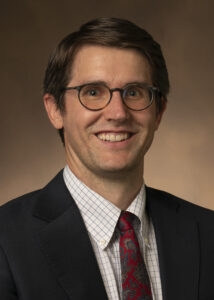Meet the new Edwards-Goodpasture PSTP Associate College Advisor: Nick Parrish, MD, PhD
by Camella Carlson (G1)
 Dr. Nick Parrish is a general surgery chief resident at Vanderbilt and leader of a research team at the RIKEN Center for Integrative Medical Sciences in Yokohama, Japan. His clinical interests are in transplant surgery and his research seeks to understand the interactions between an organism’s genome and it’s viruses. He is looking forward to serving as a college advisor and is more than happy to provide guidance and mentorship to students. To anyone finding themselves enamored with a procedural specialty and trying to reconcile the varied advice that follows, he especially invites you to reach out!
Dr. Nick Parrish is a general surgery chief resident at Vanderbilt and leader of a research team at the RIKEN Center for Integrative Medical Sciences in Yokohama, Japan. His clinical interests are in transplant surgery and his research seeks to understand the interactions between an organism’s genome and it’s viruses. He is looking forward to serving as a college advisor and is more than happy to provide guidance and mentorship to students. To anyone finding themselves enamored with a procedural specialty and trying to reconcile the varied advice that follows, he especially invites you to reach out!
Dr. Parrish grew up nearby in Knoxville, TN and went on to study neuroscience and behavioral biology at Emory. While there, he got involved with genetics research studying population genetics of E. coli and discovered a passion for the research process. Through this experience and interactions with MD mentors, Dr. Parrish pursued the MSTP training pathway, starting at the University of Alabama at Birmingham. There, he studied virology under the guidance of Dr. Beatrice Hahn, a prominent virologist and microbiologist. Though still maintaining the theme of exploring genetic variation, this project looked at how genetic variation in viruses affect their phenotypes. About a year and a half into his PhD, he transferred to the University of Pennsylvania along with his research advisor.
Clinically, Dr. Parrish initially envisioned becoming a pathologist – a natural option with his research interests. In his last year at UPenn, he had extra time related to having transferred and found a year-long research opportunity abroad. A 2010 Nature paper (Horie et al., Nature 2010) from a Japanese group describing sequences derived from an RNA virus present in the human genome piqued his interest, motivating a fellowship in Japan with the same group, a decision that would lay the foundation for future research endeavors. The project in Japan went well, tempting a longer stay or delayed residency, but the ultimate decision was to apply for general surgery residency.
How did his interest shift from pathology to general surgery? It was an experience during surgery clerkship after PhD training. He was awestruck after seeing patients’ improvements after transplant surgery and was also inspired by a surgery intern’s competency and composure in handling resuscitation after a patient coded while emerging from anesthesia.
Academic general surgery programs typically offer residents the opportunity to take two years of research after the third year of clinical training. While often conducted at the home institution, Dr. Parrish applied for funding from a Japanese early PI program that enabled him to set up a research group abroad. The group explores the influence of transposons and viral-derived sequences on human phenotypes, especially those related to immune responses. Despite the demands of residency, he still leads this group of postdoctoral researchers and research assistants while finishing up general surgery training, traveling to Japan as his schedule allows. He found that the research questions he is asking are well-suited for his team in Japan with a large community interest in endogenous viral elements and diligent, passionate team.
Dr. Parrish’s plans after residency are to start a research lab in the US and complete a transplant surgery fellowship. He hopes these two aspects will eventually tie together as his research may shed light on treating viral infections and allowing tolerance to transplanted organs.
Dr. Parrish enjoys spending time with his wife and daughter. He is grateful for his church community in Nashville and views his research as an exploration of how God created and is sustaining of the universe. Whenever in Japan, he enjoys onsen and sento, hot spring baths.
